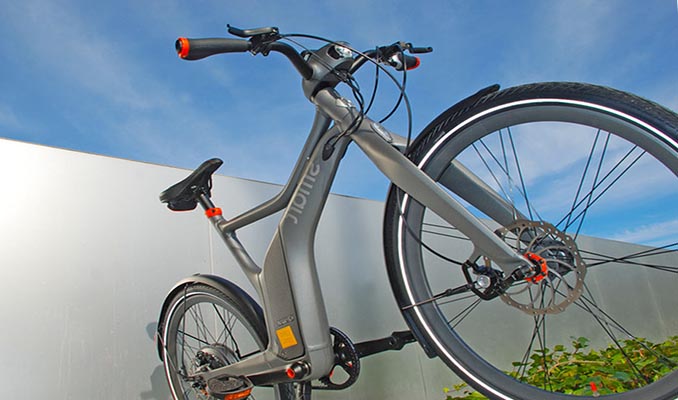One of the factors that influence the performance and utility of an electric bike is its weight. For example, weight can help determine speed, distance, and mobility. Considering this, it’s important to do some research before purchasing one. So, you may ask, “How much do e-bikes weigh?”
Generally, an e-bike weighs around 17-32 kg. However, this can vary depending on the type, battery and motor size, and materials used. If you’re interested in learning more about the weight of e-bikes and how it affects their performance, this article is intended for you.
Related:
Lighter or heavier: which is better?
When it comes to a regular bike, a lighter is usually better. Naturally, being lighter implies better maneuverability, ease of use, and mobility. But e-bikes are different, especially in how they are constructed (you can find excellent examples here).
The battery and electric motor of electric bikes makes them heavier compared to regular bikes. The extra weight of that e-bike means it will be much easier to pedal and maintain a higher speed while the motor continues to assist you.
Therefore, reducing the weight will compromise the size and capacity of the motor and battery. Less weight could mean less distance traveled. However, as larger battery manufacturers enter the e-bike business, some electric bikes can travel far despite the weight reduction.
There are rare e-bikes weighing below 18 and 14 kg that can still go far due to their smaller batteries. But these rare finds also come at a premium price.
Factors influencing the weight of an electric bike
As mentioned earlier, electric bicycles are built with batteries and electric motors, making them heavier than regular bicycles. These bikes perform well thanks to the electric assistance provided by the batteries. In fact, about 10 kg is added to the weight of the electric bike due to its design.
Additionally, having wider tires allows you to pedal on more challenging terrains such as snow and sand. But to do so, e-bikes need electric motors, which consequently add extra weight.
Electric motors are necessary to support the wider wheels of e-bikes because they make it easier to move. This is important because, without electric motors, it would be more difficult to move the bike as resistance increases. The ease of movement is also why only mountain bikes commonly have wider wheels than regular bicycles.
Weight of electric bikes based on the type
The type of electric bike defines its usage and likewise influences how much the e-bike weighs. For example, if you want to pedal as fast as possible, you’ll need a lighter bike, so a road bike would be the best choice.
But if you want to tackle more challenging trails, do off-road, or go hunting, mountain bikes are needed, which are heavier due to the wider wheels.
Of course, having a background on the different types of e-bikes and how much they weigh is necessary to help you know which one suits you. With that, below is a list of the different types of e-bikes and their corresponding estimated weights.
Folding electric bikes
These are designed for easy storage and portability. If you’re looking for something you can easily bring on trips or travels, folding e-bikes are the best choice. You can choose from the following variants along with their respective weights:
- Mini folding e-bikes: 13-18 kg
- Folding electric mountain bikes: 18-32 kg
- Folding e-bikes with fat tires: typically around 23 kg
Commuter bikes
Commuter bikes, as the name suggests, are designed for comfortable commuting. They are also called hybrid e-bikes due to their mountain bike-like handlebars and road bike wheels. For longer-distance travel, commuter e-bikes have larger batteries, making them heavier with a weight of 23-32 kg.
Road bikes
These are one of the most expensive and lighter types, usually weighing around 18 kg. Road e-bikes are made with very slim wheels and frames, as well as forward-curved handlebars. Given their design, you can pedal as fast as possible.
Electric mountain bikes
Electric mountain bikes are expected to be somewhat heavier, ranging from 18-32 kg, but commonly around 70 kg. Being one of the most common types, they are designed for both off-road and on-road use. Additionally, the suspension is able to reduce impact from bumps and produce up to 750W of power.
Touring e-bikes
Touring e-bikes, weighing around 32 kg, are intended for more leisurely use. Its large, soft seats and wide handlebars allow for a more relaxed riding experience compared to others.
Fat tire electric bikes
Similar to mountain e-bikes, fat tire bikes are designed for off-road use on challenging terrains like sand or snow. With wider tires, fat tire bikes commonly weigh between 23 and 32 kg.
Frequently Asked Questions
Are all electric bikes heavy?
No, not all electric bikes are heavy. The weight of an electric bike can vary depending on factors such as its type, battery size, motor power, and materials used in its construction. While some electric bikes can be heavier due to larger batteries and robust frames, there are also lightweight electric bike options available.
How heavy is an e-bike battery?
The weight of an e-bike battery can vary depending on its capacity and type. Generally, e-bike batteries can weigh anywhere from around 2 to 7 kilograms (4.4 to 15.4 pounds). Higher-capacity batteries tend to be heavier, but advancements in battery technology are continuously reducing their weight.
Are electric bikes heavy to lift?
Electric bikes can be heavier than regular bicycles due to the additional components such as the motor and battery. While they may require a bit more effort to lift compared to traditional bikes, the weight can vary depending on the specific model. Some electric bikes are designed to be lightweight and more manageable for lifting, especially folding electric bikes.
Are folding electric bikes heavy?
The weight of folding electric bikes can vary depending on their design and features. Generally, folding electric bikes are designed to be more compact and portable, which often means they are lighter compared to other types of electric bikes. However, the weight can still vary significantly depending on the specific model and the materials used in its construction.
How powerful is an electric bike?
The power of an electric bike is typically measured in terms of its motor wattage. Electric bikes can have motors ranging from 250 watts to 750 watts or even higher. The power output affects the bike’s performance, including its speed and ability to assist the rider.
Higher-wattage motors generally provide more power and assist the rider in achieving higher speeds and tackling steeper inclines. However, it’s important to note that different countries and regions may have regulations regarding the maximum motor power allowed for electric bikes on public roads.










